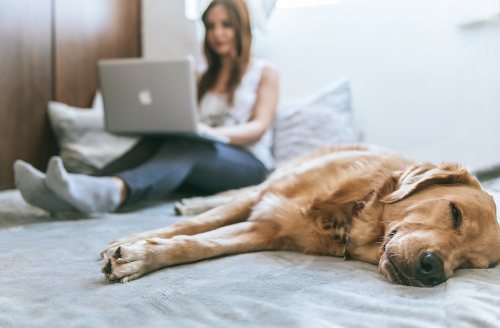Should you worry about germs if your dog sleeps in your bed?
A veterinarian shares the health considerations of sharing your bed with your pet.

If you’re a hooman (as they say on the Internet) to a Fido or Fluffy—or if you live with someone who is—you’re likely aware of the overwhelming number of health benefits associated with dog ownership. From potentially lowering blood pressure to maybe even increasing your lifespan, pups are basically an immunity booster in a cute furry package.
And so it only makes sense that dog people would want to spend as much QT as possible with their pups, including at bed time. Studies show that about 40 percent of dog owners sleep with their pets, but is it really safe to co-sleep?
While dogs can actually transmit some 70 diseases to humans, you don’t need to kick your little buddy out of bed in a hurry, says Jason Stull, VDM, PhD, an assistant professor in the Department of Veterinary Preventive Medicine at Ohio State University. “The risks for the average population are probably overall low, especially if you do some simple basic things,” he says.
Keep reading for the simple rules to follow before inviting Spot into your bed.

How to safely co-sleep with your furry friend
It may sound obvious, but washing your hands often is top priority, Dr. Stull says—especially if you’ve just touched your dog and are planning to eat a pre-bed snack (but it’s good advice to follow all the time). “This is really really important,” says Dr. Stull, pointing to a recent outbreak of multi-drug resistant Campylobacter transmitted from puppies to people, which could have been avoided with proper handwashing. And don’t forget to wash your sheets, comforter, and any other dog bedding on the reg. Probably more often than you think you should—just sayin’.
Secondly, and this is likely another obvious one, keep your dog healthy and clean. One of the biggest concerns for people who sleep with their pet is getting fleas or ticks, which is a valid concern because pet owners are more likely to encounter ticks on themselves than non-pet-owners, Dr. Stull says. (Although, to be fair, this could just be because dog owners tend to spend more time outside.) But you can help keep your bed bug-free by speaking to your vet about the appropriate flea and tick control products, which Dr. Stull says are now very safe for pets.
One of the biggest concerns for people who sleep with their pet is getting fleas or ticks, which is a valid concern because pet owners are more likely to encounter ticks on themselves than non-pet-owners.
Keeping a close eye on your dog when it’s on a walk or playing in a park is also important for co-sleepers. Eating rotten garbage or dead animals can cause your pet to become ill, and they may spread their sickness to you. (There have even by documented cases of the plague and other serious diseases being transmitted from pet to owner.)
Everyday grime and dirt that undoubtedly sticks to your dog’s paws could carry some risks, Dr. Stull says, but they “haven’t necessarily been well-quantified. As long as their paws aren’t overly full of muck and all kinds of other things, then probably—especially for the average person—the risk is pretty low.” And here’s a tip: Clean your pooch’s paws before bed time!
Of course, there are certain populations of people who should think twice before cuddling up, including young children under five, elderly people over 65, pregnant women, and the immunocompromised—generally those with HIV/AIDS or people with cancer and receiving chemotherapy, Dr. Stull says. These groups are not only more susceptible to the types of diseases dogs can spread, they’re also likely to get more severe cases.
What it really comes down to is: Before you let your dog in your bed, invite him to be part of your nightly self-care hygiene routine. You’ll both be better for it.
Also, here’s why you should brush your dog’s teeth every day. And here are the pet-friendly plants you need in your healthy home.
Sign Up for Our Daily Newsletter
Get all the latest in wellness, trends, food, fitness, beauty, and more delivered right to your inbox.
Got it, you've been added to our email list.










